

Is the management of records in a health service a fine art or more of a balance and juggle? Jennie Hyland Information Management Coordinator
About Jennie 21 years at Latrobe Community Health Service 2019: Information Management Coordinator 2005 - 2018: Records Management Officer | Privacy Officer 2002 - 2004: Senior Administrative Officer | Project Officer 1998: Senior Private Secretary to Manager Client Services Qualifications: Certificate IV in Business (Recordkeeping) Advanced Diploma Recordkeeping FOI Basics & Advanced Training
How we began Formed in February 1995 through amalgamation of the Churchill, Moe/Narracan, Morwell and Traralgon Community Health Centres Transfer of non core hospital services to LCHS and successful tendering assisted expansion During 1997/98 operation revenue grew from $2.683m to $5.465m Incorporated organisation and Registered Funded Agency under the Health Services Act, 1998 Providing community based health and support services for residents in the Latrobe Valley and the former Shire of Narracan
LCHS today One of Australia’s faster growing health services and one of 32 independent services in Victoria In 2009 incorporated under the Corporations Act 2001 as a Company Limited by Guarantee and is regulated by the Australian Charities & Not-for-profits Commission Act 2012. It is also registered with the Victoria Government as a community health centre under the Health Services Act 1988 Operating revenue, excluding capital grants, increased to $117.7m Operates from more that 40 sites in Victoria and employs around 1000 staff. Origins are in Gippsland, but have grown rapidly in recent years, with GP services in metro Melbourne, partner agency with NDIS, home care packages across the state and in May 2019 commenced Veterans Home Care assessment & coordination across 11 regions in Western Australia
Records team at LCHS Records team: Functions: ED Corporate Information Management Coordinator: Implementing & managing an EDRMS Manager Client Reporting & Records team: Records Health Access requests Records Privacy Officer Information Client Reporting Management Management including Privacy Data Quality within client databases Archiving records (corporate & health) 3 EFT 1 EFT Support with records enquiries
Recordkeeping at LCHS Records Factors
Reporting, compliance and legislative requirements Reporting Legislation ASIC Act 2001 Internal reporting to: Charter of Human Rights & Responsibilities Act 2006 Board and/or subcommittee Drug Poisons & Controlled substances Executive Equal Opportunity Act 2010 Managers Health Services Act Health Records Act 2001 (Vic) Stats and data to Funding bodies on monthly or quarterly basis Privacy & Data Protection Act 2014 (Vic) Privacy Act 1988 (Cmth) Internal & External auditors Registration Acts for Physios, Podiatrists etc Annual Report & Quality of Care report Public Records Act 1973 + many more
Challenges 47 locations with 1000 staff AHPRA practitioner requirements 20+ PO Boxes Recordkeeping with health records – 47 street addresses separating health information from 1000+ email address statistical requirements 10+ fax numbers Changing technology Multiple client databases – 10+ Resourcing No EDRMS Responding within timelines for health Shared drives access requests Partnership arrangements eg NDIS Keeping policies and procedures up to Source documentation post scanning date Transition from paper files to electronic Changes to landscape eg FVISS and CISS Adding services: Compliance with privacy principles with Existing changing environment New funding
Opportunities Harness the power of technology and foster innovation to: develop or streamline processes Manage our records in an evolving manner Join with similar agencies to develop information that can be shared to help maintain records Minimise the creation of paper Use growth of organisation to drive or influence work practice changes
Lessons learnt Have confidence and speak with confidence Be approachable Don’t be afraid to ask – why reinvent the wheel Learn and understand processes (not just records) Join networking groups You will always be ahead of another organisation and slightly behind another Treat challenges as learning opportunities – getting guidance can be personal development Share the knowledge – people will eventually listen Listen and find a balance with practice v. recordkeeping
Conclusion: Recordkeeping in the health sector is the fine art of juggling and balancing!
Recommend
More recommend